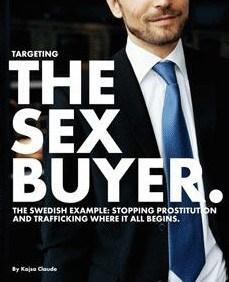This essay first appeared in Cliterati on June 9th; I have modified it slightly for time references and to fit the format of this blog.
The casual modern observer can be forgiven for perceiving the issue of “human trafficking” as nothing but a moral panic conjured up as a disguise for anti-sex work efforts, inextricably bound up with “end demand” rhetoric and supported by dodgy statistics, grandiose claims and bombastic rhetoric, because that is what it has become. But it wasn’t always that way; though the issue was grounded from its very beginning in the old “white slavery” myth, groups like the Global Alliance Against Traffic in Women (founded in 1984) worked to alter “the anti-trafficking paradigm by introducing the tools of the human rights framework…[and] de-linking trafficking from prostitution.” They were quite successful for a time:
…the 1994 Utrecht Conference on Traffic in Persons…actually called for the decriminalization of prostitution and efforts to improve health and safety regulations for sex workers worldwide…[but soon after] there emerged what some scholars have termed an unlikely collaboration between abolitionist feminists and conservative Christian groups in the United States whose common aim is to eradicate prostitution…
 As I’ve explained before, the anti-sex crowd created a mythology in which the typical sex worker is a “trafficked child slave”, and thereby hijacked what was becoming a positive force for human rights, turning it into a vehicle for repression; once governments realized they could use it as an excuse to restrict migration, the corruption of a noble cause into a base one was complete. It is extremely likely that when prohibitionists and governments first started to offer aid and money in the late ‘90s, they were welcomed by advocates who had no idea of their true motivations; unfortunately, by the time they realized what was happening it was far too late. But we can learn a lesson from them: when someone offers help it’s wise to consider his motivations, and to use the proverbial “long spoon” if it’s impossible or impractical to reject the deal altogether. Here are two recent examples from the United States:
As I’ve explained before, the anti-sex crowd created a mythology in which the typical sex worker is a “trafficked child slave”, and thereby hijacked what was becoming a positive force for human rights, turning it into a vehicle for repression; once governments realized they could use it as an excuse to restrict migration, the corruption of a noble cause into a base one was complete. It is extremely likely that when prohibitionists and governments first started to offer aid and money in the late ‘90s, they were welcomed by advocates who had no idea of their true motivations; unfortunately, by the time they realized what was happening it was far too late. But we can learn a lesson from them: when someone offers help it’s wise to consider his motivations, and to use the proverbial “long spoon” if it’s impossible or impractical to reject the deal altogether. Here are two recent examples from the United States:
The Illinois General Assembly voted…to end felony prostitution…Lynne Johnson, policy director for Chicago Alliance Against Sexual Exploitation (CAASE)…said the felony punishment only served to victimize people in the sex trade even further…“After people…leave the sex trade…their felony record prevents them from getting good housing or…a good job”…CAASE is part of End Demand, a campaign that wants to change how law enforcement deals with prostitution. Advocates say johns, pimps and traffickers should be held more accountable…
Now, on its face this is a good thing; in the US exchanging money for sex is illegal in and of itself, unlike most Western countries where only certain acts such as brothel-keeping, soliciting or “living on the avails” are criminalized. And in Illinois and a few other states (Arizona, Florida, Idaho, Indiana, Louisiana, Michigan, Oklahoma, South Carolina, Texas and Vermont) prosecutors are actually able to charge some sex workers with felonies. This legislative act would remove Illinois from that list, but note the agenda of the group and its rationale for the campaign: these people don’t want to help sex workers, but rather to infantilize us as “victims” and to persecute clients (a group that in Chicago includes transgender sex workers) and anyone who can be labeled a “pimp”. Their goals are not compatible with ours; this particular step just happens to coincide. Here’s another, similar case:
…Heartbeat International…which [operates] more than 1,300…[anti-abortion “crisis pregnancy”] centers…is urging the United States Supreme Court to overturn a federal pledge against prostitution. The Becket Fund for Religious Liberty and the Christian Legal Society are doing the same. Their position may seem counter-intuitive, since all three…oppose prostitution. But the case boils down to whether or not the government can require groups to adopt its views before it gives them funds. At issue [is] a Bush-era program to fight HIV/AIDS that requires grant winners to “explicitly [oppose] prostitution and sex trafficking”…[but] some fear that the antiprostitution policy could inspire the government to attach loyalty oaths to other federal benefits. It could require an organization like Heartbeat to tell clients about abortion, or a religious nonprofit to affirm the government’s views on gay marriage or contraception, to retain tax-exempt status. Many believe such oaths violate the First Amendment and its promise of freedom of speech…
So though these people are apparently on our side, all they’re really doing is protecting their own interests; once this is over they’ll be right back in bed with the other prohibitionists. Even groups like the American Civil Liberties Union are weak allies indeed; though they support decriminalization in principle, that’s only because to do otherwise would weaken their true interests: privacy and discrimination concerns. While the ACLU invests considerable money and energy into civil rights minutiae, it has never launched a challenge to any prostitution law and its representatives are fond of making ignorant, bigoted statements like “People don’t choose to become prostitutes.”
There are, however, a few real friends of sex workers out there, groups who truly care about human rights and have spoken out for decriminalization. The aforementioned Global Alliance Against Traffic in Women is one of them; it has released a number of reports exposing the harms caused by the “anti-trafficking” movement and debunking the myths it spreads to advance its agenda. And in May it sent a report to the UN calling for an end to support for “end demand” policies, discussed here by Cathy Reisenwitz:
The [GAATW]…report calls for countries to …consider…decriminalising sex work and practices around it…to reduce the opportunities for exploitative labor practices…Anti-trafficking discussions on demand have historically been stymied by…efforts to eradicate the sex work sector by criminalising clients, despite protests from sex workers rights groups and growing evidence that such approaches do not work…[under the Swedish model] sex workers are harassed instead of helped by police, forced to undergo invasive searches and testify against their customers and have to rely more on their pimps to find clients. And the result? No change in supply, no change in demand…
 The Swedish Model is currently being pushed for Scotland by MSP Rhoda Grant and “end demand” tactics have become extremely popular in American police departments as well; brown-nosed academics ignore the evidence to proclaim that the approach is “successful”. But the GAATW is not the only large human rights organization fighting this monstrous violation; the highly-respected Human Rights Watch, which recently called for worldwide decriminalization of personal drug use, has also officially announced its support for decriminalization of sex work. Thus far the position has only appeared in a report on China and a journal article condemning the use condoms as “evidence” of prostitution:
The Swedish Model is currently being pushed for Scotland by MSP Rhoda Grant and “end demand” tactics have become extremely popular in American police departments as well; brown-nosed academics ignore the evidence to proclaim that the approach is “successful”. But the GAATW is not the only large human rights organization fighting this monstrous violation; the highly-respected Human Rights Watch, which recently called for worldwide decriminalization of personal drug use, has also officially announced its support for decriminalization of sex work. Thus far the position has only appeared in a report on China and a journal article condemning the use condoms as “evidence” of prostitution:
The criminalization of voluntary, consensual sexual relations among adults is incompatible with…a number of internationally recognized human rights…Human Rights Watch has repeatedly documented the negative consequences of the criminalization of sex work on access to rights to personal autonomy and privacy, freedom from discrimination and violence, health, and justice…positions that cast sex workers only as victims, and eliminate the possibility of voluntary sex work, deny sex workers’ agency and their rights to exercise their autonomy and engage in private, consensual behaviour…Human Rights Watch has concluded that ending the criminalization of sex work is critical to achieving public health and human rights goals.
I corresponded last month with Megan McLemore, one of that paper’s authors, and she assured me that HRW’s next report on sex work in the US (later this year) will “contain a clear call for decrim of sex work on human rights grounds.” This is wonderful news; HRW thus joins GAATW, several UN agencies and countless health officials in supporting the right of adults to consent to sex even when money is involved. Though it’s a shame there are so many people who only pretend to care about sex workers in order to suppress sexuality, an ever-growing number support our cause simply because it’s the right thing to do.
